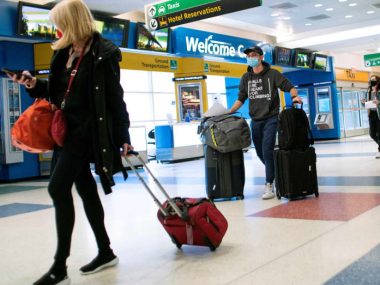What documents do I need to enter the US?
sometimes you may ask yourself ‘What documents do I need to enter the US?’ Entering the United States requires careful preparation, including ensuring you have the necessary documents to comply with U.S. immigration regulations. The specific documents you need may vary based on factors such as your nationality, the purpose of your visit, and the type of visa you hold. This comprehensive guide aims to outline the essential documents needed to enter the U.S., providing links to official resources for the latest information.
**1. Passport:
The primary and most fundamental document required for entry into the United States is a valid passport. Ensure that your passport is current and will remain valid throughout your intended stay. U.S. Customs and Border Protection (CBP) provides detailed information on passport requirements, which can be accessed here.
**2. Visa:
Depending on your nationality and the purpose of your visit, you may need a visa to enter the U.S. A visa is a stamp or document placed in your passport by a U.S. consular official, indicating that you are eligible to travel to a U.S. port of entry. The U.S. Department of State’s Visa Wizard can help you determine if you need a visa and, if so, what type is appropriate for your trip.
**3. Electronic System for Travel Authorization (ESTA):
If you are traveling under the Visa Waiver Program (VWP), citizens from eligible countries are required to obtain an Electronic System for Travel Authorization (ESTA) before boarding a U.S.-bound flight. The official ESTA website provides an online application process and additional information.
**4. Form DS-160:
For those applying for a nonimmigrant visa, the Online Nonimmigrant Visa Application, Form DS-160, is a crucial step. The U.S. Department of State’s Consular Electronic Application Center allows applicants to complete and submit the DS-160 form.
**5. Proof of Financial Means:
Immigration officials may request evidence of your ability to financially support yourself during your stay in the U.S. This may include bank statements, letters of sponsorship, or other financial documentation. Check with the U.S. embassy or consulate in your home country for specific requirements.
**6. Return or Onward Ticket:
In some cases, travelers may be asked to provide proof of a return or onward ticket to demonstrate their intention to leave the U.S. before their authorized stay expires.
**7. Customs Declaration Form:
Upon arrival in the U.S., you will be required to complete a Customs Declaration Form (CBP Form 6059B). This form collects information about the items you are bringing into the country. Familiarize yourself with the Customs and Border Protection website for guidance on completing this form.
**8. Health and Vaccination Records:
While not always mandatory, it’s advisable to carry your health and vaccination records, especially during the ongoing global health situation. Check the latest requirements and recommendations from the Centers for Disease Control and Prevention (CDC) and other relevant health authorities.
Ensuring you have the correct documents is essential for a smooth entry into the United States. It is imperative to stay updated on any changes to immigration policies, and consulting official government websites, such as those provided by U.S. Customs and Border Protection and the U.S. Department of State, is highly recommended for the most accurate and current information.
9. Travel Insurance:
10. Student and Exchange Visitor Information System (SEVIS) Fee Receipt:
If you are entering the U.S. for educational purposes with an F or M visa or participating in an exchange program with a J visa, you may be required to pay the SEVIS fee. The receipt of this fee payment is an essential document to present during your visa application process. Details about the SEVIS program and fee payment can be found on the U.S. Immigration and Customs Enforcement (ICE) website.
11. Employment Authorization Documents:
If you are entering the U.S. for employment purposes, it is crucial to carry the necessary employment authorization documents. This may include an Employment Authorization Document (EAD) or other work-related permits. Check with the U.S. Citizenship and Immigration Services (USCIS) for details on employment-related documentation.
12. Marriage or Family-related Documents:
If you are entering the U.S. for reasons related to marriage or family reunification, it is advisable to carry relevant documentation such as marriage certificates, birth certificates, and any other proof of relationship. Consular officers may request these documents during the visa application process.
13. Accessibility and Special Considerations:
If you have specific accessibility needs or medical conditions, it is recommended to carry relevant documentation, such as medical certificates or a letter from your healthcare provider. This ensures that you receive appropriate assistance and accommodations during your journey.
14. Emergency Contacts:
Keep a list of emergency contacts, including the contact information of the nearest U.S. embassy or consulate, family members, and friends. In case of unforeseen circumstances, having this information readily available can be invaluable.
15. Stay Informed about COVID-19 Protocols:
Given the ongoing global pandemic, staying informed about any COVID-19-related entry requirements, testing protocols, and quarantine measures is crucial. Refer to the official CDC guidelines for the latest information on travel during the pandemic.
As you plan your trip to the United States, it’s essential to gather and organize the required documents based on the purpose of your visit. Regularly check official government websites for updates and consult with the U.S. embassy or consulate in your country for specific guidance. Being well-prepared ensures a smooth entry process and allows you to focus on enjoying your time in the United States. Safe travels!
Category: Immigration
Ekpo NJ
I am Ekpo NJ, the visionary Editor behind Bwkreators, and I possess the profound expertise of an SEO Mastermind. With unwavering determination, I meticulously craft each and every blog post that graces the pages of Bwkreators, My mission? To create nothing short of EPIC content that leaves an indelible impression on all who have the privilege to indulge in its brilliance.


